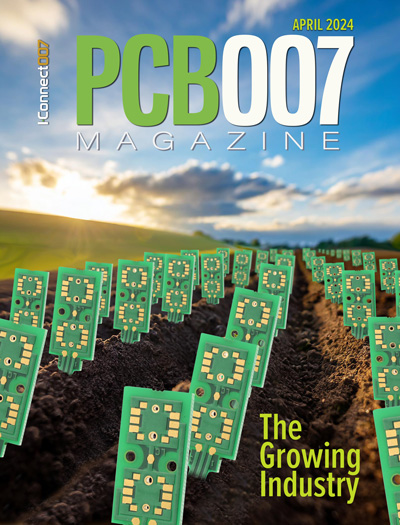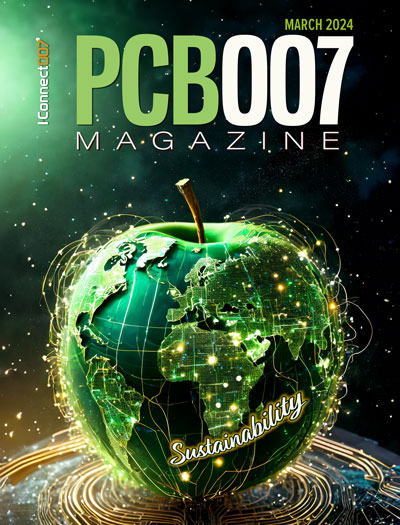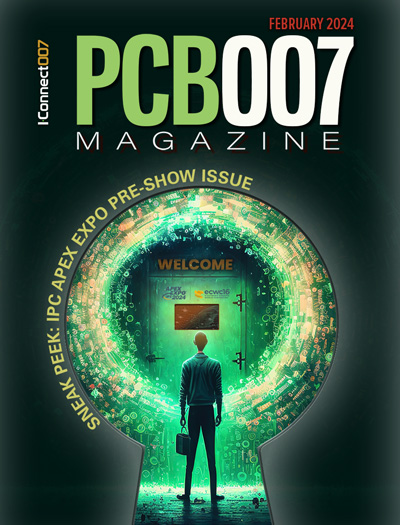-

- News
- Books
Featured Books
- pcb007 Magazine
Latest Issues
Current Issue
The Growing Industry
In this issue of PCB007 Magazine, we talk with leading economic experts, advocacy specialists in Washington, D.C., and PCB company leadership to get a well-rounded picture of what’s happening in the industry today. Don’t miss it.

The Sustainability Issue
Sustainability is one of the most widely used terms in business today, especially for electronics and manufacturing but what does it mean to you? We explore the environmental, business, and economic impacts.

The Fabricator’s Guide to IPC APEX EXPO
This issue previews many of the important events taking place at this year's show and highlights some changes and opportunities. So, buckle up. We are counting down to IPC APEX EXPO 2024.
- Articles
Article Highlights
- Columns
Search Console
- Links
- Events
||| MENU - pcb007 Magazine
EIPC Summer Conference in Munich to Discuss PCB Supply Chain Under the EU Chips Act
May 19, 2023 | Pete Starkey, I-Connect007Estimated reading time: 2 minutes
A key attraction at EIPC’s Summer Conference, June 15-16 in Munich, will be the presentation by Stan Heltzel, Materials Engineer at the European Space Agency. Stan is responsible for qualification of Printed Circuit Board manufacturers and technology development, and is the convenor of working groups on space standardisation.
The subject of his presentation is supporting the PCB supply chain under the EU Chips Act. It will describe a white paper, recently issued by Eurospace, calling for the wide strengthening of PCB technology and its supply chain in all market segments. It focuses attention on the weak European PCB ecosystem causing unavailability in its own supply chain. Raw materials are almost exclusively manufactured outside Europe, the workforce is difficult to maintain, education institutes do not offer adequate training, and critical equipment and chemistry need to be imported, which hampers the availability of senior service personnel from these overseas companies.
Here is an abstract of Stan Heltzel’s paper:
“The number of PCB facilities in Europe has been continuously declining for several decades. Although in recent years the revenue appears to have stabilised, over a longer time span also this indicator follows a declining trend. About 60% of PCBs in Europe are imported, mostly from China. This dependency is most prevalent in volume markets, but also NewSpace equipment integrators are occasionally sourcing PCBs overseas, motivated by lower cost, shorter lead-time and in some cases a better capability. Qualification schemes and contractual conditions ensure local sourcing of PCBs in the high-reliability market segments of space and defence. For this low volume, high mix industry the most critical impact is an indirect one: the weak European PCB ecosystem causes unavailability in its own supply chain. Raw materials are almost exclusively manufactured outside Europe, the workforce is difficult to maintain, education institutes do not offer adequate training, and critical equipment and chemistry need to be imported, which hampers the availability of senior service personnel from these overseas companies.
The end of a globalised market and the consequential reshoring has been initiated by the US-Chinese trade conflict and further deepened by the supply chain disruptions during the pandemic and the Ukrainian war. There is much excitement about the development of local chips technology and its ecosystem. The European Chips Act provides development opportunities from foundry to OSAT. But the act does not analyse the ecosystem beyond back-end packaging and is not inclusive of system level packaging, i.e. PCB technology and assembly. The global electronics industry struggles with the ‘hidden reliability treat’ in microvias. Yet it remains difficult to obtain development funds. This has caused critical failure of assembled flight electronics in several ESA projects. A state-of-the-art FPGA was developed and space qualified. But the routing of this part required microvias, which appeared to be failing. Not only the malfunctioning modules were scrapped, but also other - working - modules from batches that were affected by this microvia weakness. This presentation will describe a white paper, recently issued by Eurospace, calling for the wide strengthening of PCB technology and its supply chain in all market segments.”
For full details of the EIPC Summer Conference, click here.
Suggested Items
Boeing Opens Research & Technology Center in Japan
04/23/2024 | BoeingBoeing today opened a Boeing Research & Technology (BR&T) Center in Japan that will focus on innovation to enable the commercial aviation industry meet its goal of net zero carbon emissions by 2050.
Schweizer Electronic Appoints Thomas Gottwald as New Member of the Executive Board
04/23/2024 | Schweizer Electronic AGThe Supervisory Board of Schweizer Electronic AG has appointed Mr. Thomas Gottwald to the Executive Board as CTO (Chief Technology Officer) for a period of 3 years with effect from 1 May 2024.
US Department of Defense Selects Intel Foundry for Phase Three of RAMP-C
04/23/2024 | IntelThe U.S. Department of Defense (DoD) has awarded Intel Foundry Phase Three of its Rapid Assured Microelectronics Prototypes - Commercial (RAMP-C) program.
Real Time with... IPC APEX EXPO 2024: Industrial Quality Solutions from Zeiss
04/23/2024 | Real Time with...IPC APEX EXPOEditor Nolan Johnson and Herminso Gomez of Zeiss Group discuss the company's industrial quality solutions, with a focus on X-ray technology. Zeiss provides a range of microscopy options and Herminso highlights the advantages of X-ray technology for aerospace, medical, and consumer electronics sectors.
AIM Solder’s Dillon Zhu to Present on Ultraminiature Soldering at SMTA China East
04/22/2024 | AIMAIM Solder, a leading global manufacturer of solder assembly materials for the electronics industry, is pleased to announce that Dillon Zhu will present on the topic: Ultraminiature Soldering: Techniques, Technologies, and Standards at SMTA China East. This event is being held at the Shanghai World Expo Exhibition & Convention Center from April 24-25.


